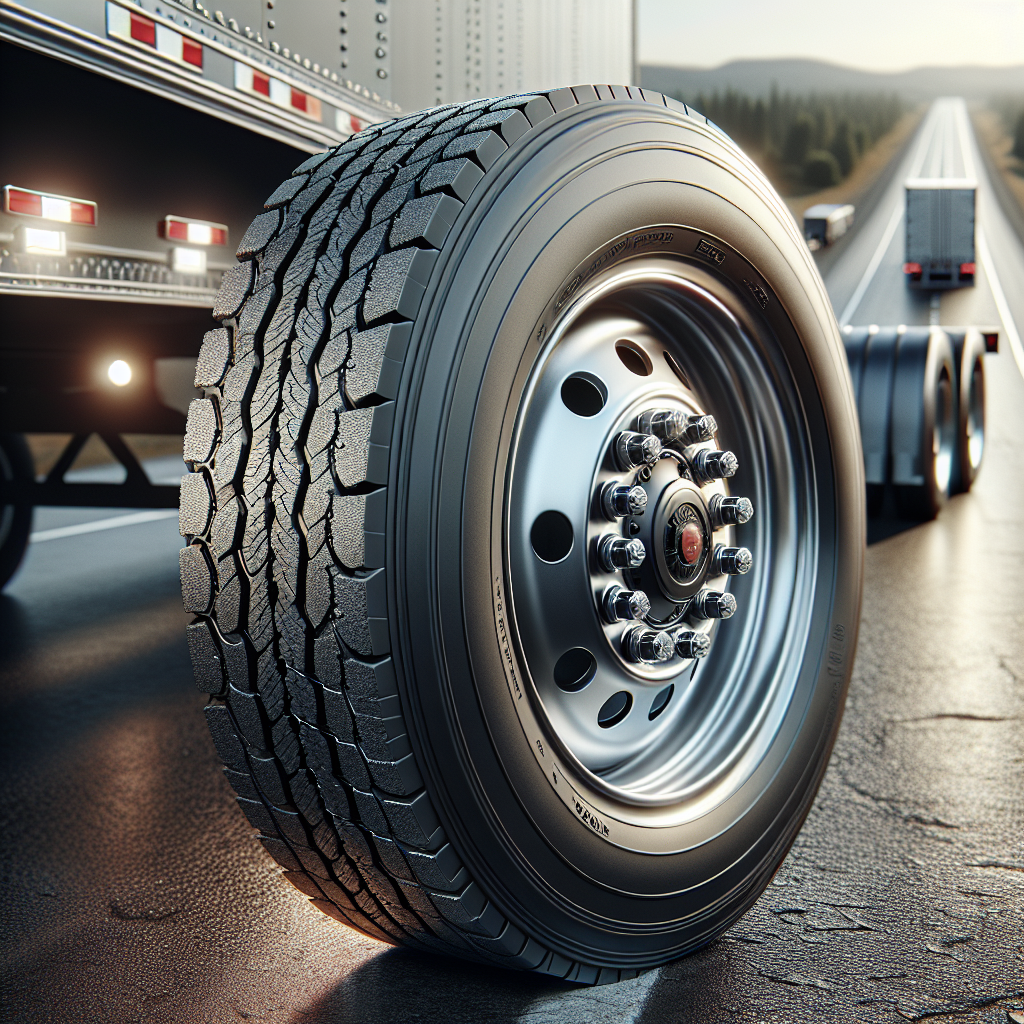When it comes to safe towing, understanding the importance of trailer tire safety cannot be overstated. Tires are the only point of contact between your trailer and the road, making their condition critical for safe travels. Regular maintenance and inspection play a vital role in preventing tire-related accidents, which can lead to significant damage and endanger lives.
To ensure optimal performance, consider the following essential factors:
- Proper Inflation: Maintaining the correct tire pressure is crucial. Under-inflated tires can cause overheating, while over-inflated tires may lead to blowouts.
- Tread Depth: Regularly check the tread depth to ensure adequate grip and control. A worn-out tread can severely reduce traction, especially in wet conditions.
- Visual Inspections: Look for signs of damage such as cracks, bulges, or foreign objects lodged in the tire. Addressing these issues promptly can prevent further complications.
- Load Capacity: Always adhere to the manufacturer’s guidelines regarding load capacity to avoid excessive wear and tear on your tires.
By prioritizing trailer tire safety, you not only protect your investment but also ensure the safety of everyone on the road. Tow with peace of mind, knowing that TrailerWatchdog is standing guard. Visit trailerwatchdog.com for more information on how to keep your trailer safe!
Key Signs of Trailer Tire Wear and Damage

Recognizing the key signs of trailer tire wear and damage is essential for maintaining safety on the road. Timely detection of these issues can prevent accidents and prolong the lifespan of your tires. Here are some critical indicators to watch for:
- Uneven Tread Wear: If you notice that one side of the tire is wearing more than the other, it may be a sign of improper alignment or suspension issues.
- Cracks and Cuts: Inspect your tires for visible cracks or cuts in the sidewall. These can lead to blowouts if not addressed promptly.
- Bubbles or Blisters: Look for any bulges or blisters on the tire surface. They indicate internal damage and can compromise the tire’s integrity.
- Low Tread Depth: A tread depth of 2/32 of an inch or less is considered unsafe. Use the penny test: if Lincoln’s head is visible, it’s time to replace your tire.
- Excessive Vibration: If you feel unusual vibrations while towing, it could indicate a tire imbalance or internal damage. Pay attention to these warnings and have your tires inspected.
Regularly checking for these signs not only enhances your safety but also saves you from costly repairs down the line. Stay vigilant and proactive in maintaining your trailer's tires to ensure a smooth and safe journey.
Best Practices for Trailer Tire Maintenance
Implementing best practices for trailer tire maintenance is crucial to ensure your tires remain in optimal condition and to maximize safety while towing. Here are several effective strategies:
- Regular Inspections: Conduct thorough inspections of your tires at least once a month. Check for signs of wear, damage, and proper inflation levels.
- Maintain Proper Inflation: Keep your tires inflated to the manufacturer’s recommended pressure. Under-inflated tires can lead to overheating and blowouts, while over-inflation can cause uneven wear.
- Rotate Tires: Just like with vehicles, rotating your trailer tires can help ensure even wear. Aim to rotate them every 5,000 to 7,500 miles or as advised by the manufacturer.
- Balance and Align: Ensure your trailer tires are properly balanced and aligned. Misalignment can result in uneven wear and reduced handling.
- Store Properly: If you’re not using your trailer for an extended period, store it in a cool, dry place away from direct sunlight. Consider using tire covers to protect them from UV damage.
By following these tire maintenance practices, you can significantly extend the life of your trailer tires and enhance your overall towing experience. Regular care not only ensures your safety but also contributes to better fuel efficiency and handling.
How to Properly Inflate Your Trailer Tires

Properly inflating your trailer tires is a fundamental aspect of trailer tire safety that can greatly impact performance and longevity. Here’s a step-by-step guide to ensure your tires are inflated correctly:
- Know the Recommended Pressure: Always refer to the manufacturer’s specifications for the correct tire pressure. This information can usually be found on a sticker located on the trailer frame or in the owner’s manual.
- Use a Reliable Pressure Gauge: Invest in a quality tire pressure gauge. Digital gauges are often more accurate than analog ones and can provide a quick reading.
- Check Pressure When Cold: Tire pressure should be checked when the tires are cold, ideally before you start your trip. Driving heats up the tires and can increase the pressure reading, leading to inaccurate results.
- Inflate to the Right Level: If your tires are under-inflated, add air until you reach the recommended pressure. Avoid over-inflation, as this can lead to reduced traction and uneven wear.
- Inspect for Leaks: After inflating, check each tire for air leaks. Apply soapy water to the valve and around the tire's surface; if you see bubbles forming, you may have a leak that needs addressing.
Regularly maintaining the correct tire pressure not only improves safety by enhancing handling and braking but also promotes better fuel efficiency. Make it a habit to check your trailer tire pressure before every trip to ensure you’re traveling safely and efficiently.
Choosing the Right Tires for Your Trailer

Selecting the appropriate tires for your trailer is crucial for ensuring both safety and performance on the road. With various options available, making an informed choice can help avoid potential issues. Here are key factors to consider when choosing the right tires for your trailer:
- Tire Type: Different trailers require different tire types. Look for ST (Special Trailer) tires, which are designed specifically for trailers and offer better load capacity and durability compared to regular passenger car tires.
- Load Rating: Each tire has a load rating that indicates how much weight it can safely carry. Check your trailer’s specifications and ensure that the tires you choose can handle the total load, including cargo and the trailer itself.
- Tread Pattern: The tread design affects traction and performance. For trailers that will be used on various surfaces, select tires with a tread pattern that provides good grip in both wet and dry conditions.
- Size Specifications: Ensure that the tire size matches the specifications recommended by the manufacturer. Choosing the wrong size can lead to handling issues and increased wear.
- Quality and Brand: Opt for reputable brands known for durability and safety. While it may be tempting to go for the cheapest option, investing in high-quality tires can save money in the long run by reducing the risk of blowouts and improving fuel efficiency.
By taking the time to select the right tires for your trailer, you can enhance your safety on the road and ensure a smoother towing experience. Make informed decisions and consult with experts if you're uncertain about the best tire options for your specific needs.
Utilizing Technology for Enhanced Tire Safety

In today's fast-paced world, leveraging technology can significantly enhance trailer tire safety. With advancements in monitoring systems, trailer owners can now keep a vigilant eye on tire health and performance, ensuring safer journeys.
One of the most innovative solutions available is the use of tire pressure monitoring systems (TPMS). These systems continuously monitor tire pressure and temperature, alerting drivers to any abnormalities that may indicate potential issues. Maintaining the correct tire pressure is vital as under-inflated tires can lead to poor handling, reduced fuel efficiency, and increased wear.
Additionally, systems that provide real-time data on axle temperature are invaluable for preventing catastrophic failures. High axle temperatures can signal excessive friction, which could lead to tire blowouts or other serious problems. By being proactive, drivers can address these issues before they escalate.
Another technological advancement worth considering is integrating smart trailer systems that offer comprehensive monitoring. These systems can provide insights into tire condition, load distribution, and even predictive maintenance alerts, giving trailer owners the information they need to stay ahead of potential safety hazards.
Utilizing technology not only enhances safety but also promotes peace of mind for drivers. With tools like TrailerWatchdog, you can monitor your trailer’s tire health and axle temperatures effortlessly. Tow with peace of mind, knowing that trailerwatchdog is standing guard.








